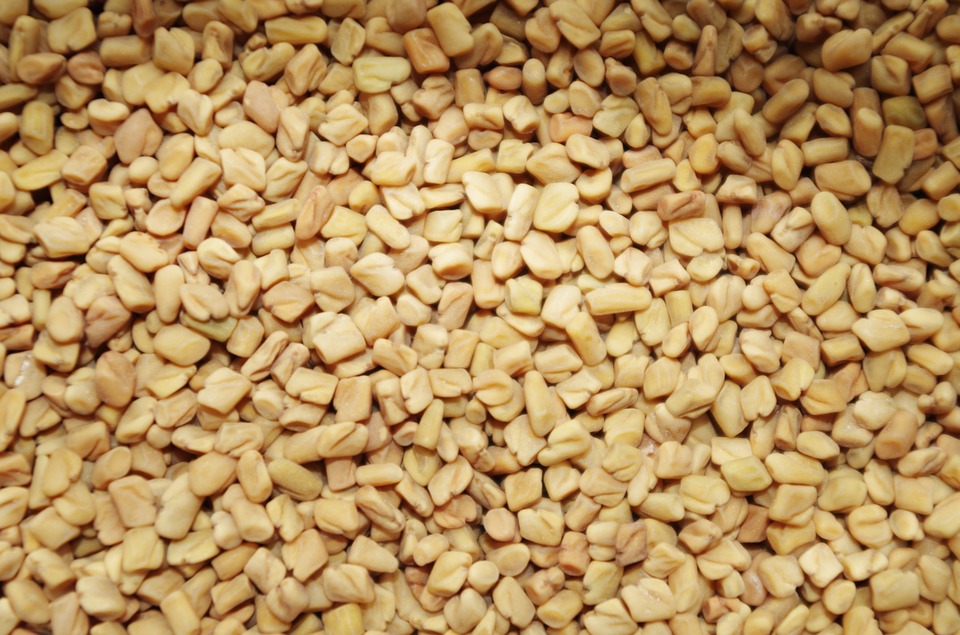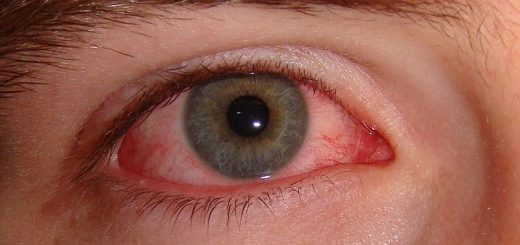42 Tea Tree Oil Health Benefits
Tea tree oil is derived from the leaves of tea tree plants. The tea tree is so-named because its leaves were used to make tea in the eighteenth century by sailors on the swamp Australian coasts. It is often confused with the tea plant, which is a different plant entirely and is used to create black and green teas.
Health Benefits of Tea Tree Oil
-
Reduce Acne
Applying gels with around a 5% tea tree oil content can be as effective as other more chemical-based gels when it comes to treating acne. It’s also far less harsh on the skin than these chemical gels or creams and can soothe your skin more. Try using a tea tree-based gel twice a day for up to 45 days and you should start to see an improvement in your acne.
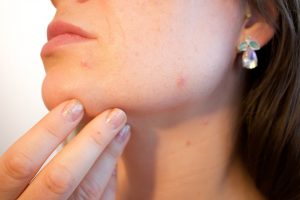
Using this home remedy regularly can help to both prevent and treat acne
-
Treat Nail Fungus
Applying tea tree oil to nails that have been subject to a fungal infection can really help to reduce the infection. Apply the oil twice a day for six months and you should see the infection improve. In fact, 56% of people using this method also found that the appearance of their nail improved after using the oil. It also helped to reduce their symptoms of fungal infection.
-
Athlete’s Foot
Applying creams containing tea tree oil is known to help relieve the symptoms of other fungal infections, like Athlete’s foot. The oil can help reduce the intensity of a number of symptoms including scaling, itching, and burning. It also has anti-inflammatory qualities which mean it’s great at taking down any swelling or inflammation. To completely cure the infection, you’ll need a cream that has at least a 25% concentration of tea tree oil. Anything less will reduce symptoms but won’t be strong enough to completely kill the infection.
-
Reduced Risk of Dandruff
Because of its soothing qualities, tea tree oil is great for soothing dry and flaky skin. As a result, using a tea tree oil shampoo can help nourish the scalp and reduce your dandruff. It can also help to decrease other dandruff related issues such as overly greasy hair and itchiness.
-
Hand Sanitizer
One of the great health benefits of tea tree oil is that it makes a brilliant hand sanitizer. It’s been shown to kill several forms of common bacteria and viruses which get onto the skin and would otherwise cause you to become ill. One study found that adding tea tree oil to regular cleansers actually made them more effective at defending against E. coli.
-
Insect Repellent
Tea tree oil can play a part in keeping insects at bay. It seems that some of the natural elements and scents of tea tree oil act as a natural repellent to a number of pesky insects.

Keep mosquitoes at bay by wearing tea tree oil
-
Reduce Body Odor
Tea tree oil has potent antibacterial effects which can help to keep a lid on pongy underarm smells caused by excess perspiration. Whilst sweat itself is not smelly, the secretions can mix with bacteria on your skin which then. By getting rid of much of these bacteria, deodorants containing tea tree oil can actually help combat the smell. This makes tea tree oil a natural alternative to many commercial deodorants.
-
Antiseptic for Minor Cuts and Scrapes
Injuries that result in breakage of the skin can be open to infection. This is because they make it easier for germs and bacteria to get into the bloodstream. One of the many health benefits of tea tree oil antibacterial properties is that it can help reduce this risk.
Make sure you clean your cut thoroughly with plain (with no fragrance) soap and water before adding a little tea tree oil mixed with coconut oil to the damaged skin. This will help to disinfect the wound. You should keep doing this until the wound has scabbed over.
-
Boost Wound Healing
Not only can tea tree oil prevent wounds from becoming infected, but it can also speed up healing. Tea tree oil is an anti-inflammatory meaning it triggers your white blood cells. White blood cells are crucial for the healing process as they help your blood to clot and fight off infections.
-
Chemical-Free Mouthwash
Some studies suggest that tea tree oil can help fight the germs that cause bad breath and tooth decay. This shouldn’t be surprising as we already know the oil has antibacterial properties. You can make a tea tree oil mouthwash by mixing a drop of tea tree oil with a cup of warm water and swirling it around your mouth for thirty seconds. Make sure to spit out all the mouthwash though as, like more commercial mouthwashes, it shouldn’t be ingested and could make you ill if you do swallow it.
-
Soothe Skin Inflammation
One of the many health benefits of tea tree oil is that it’s great for soothing skin. It can be really useful in calming irritations caused by allergic reactions by reducing redness and itchiness. Combine a few drops of tea tree oil with a tablespoon of extra virgin olive oil and another tablespoon of coconut oil. You can then apply this mixture to the affected skin and your symptoms should start to reduce. Keep applying the mixture twice a day until your skin is back to normal.

Extra virgin olive oil will work the best, but you can use any type of olive oil for this home remedy
-
Relieve Psoriasis Symptoms
Psoriasis is an autoimmune disease which causes outbreaks of red, itching and scaly skin. It’s usually concentrated on the scalp but it can flare up anywhere on the body. While there are medications that can help to manage symptoms, there isn’t a complete cure as of yet. However, the anti-inflammatory properties of tea tree oil can help.
Mix around ten drops of tea tree oil with two tablespoons of coconut oil and apply this to the affected area two to three times a day. This should soothe the skin and bring your symptoms down. characterized by outbreaks of red, itchy, scaly skin.
-
Prevent Antibiotic Resistance
Tea tree oil are becoming used more and more often in replacement of more conventional medications. This is because they are often as effective and don’t cause adverse side effects like antibiotic resistance. If bacteria become resistant to antibiotics it can prevent the medication from working. Many scientists are optimistic that using essential oils, like tea tree oil, can significantly reduce the risk of antibiotic resistance. If it does, this would be a huge breakthrough in medicine as the more bacteria that become resistant, the more medications will begin to fail.
- Relieve Congestion and Respiratory Tract Infections
Tea tree oil is known to have antibacterial properties, which means it can naturally fight off bacteria that would otherwise cause infections. It also improves antiviral activity. Both these qualities make tea tree oil great at reducing congestion and fighting off pathogens that cause coughs, colds, and the flu. This is why tea tree oil is a common ingredient in many cough syrups.
-
Treat Head Lice
In our home remedies for lice article, we discussed how tea tree oil can be used to tackle head lice. If you missed that article, here’s what you need to know. Tea tree oil has strong insecticidal effects, which means it can suffocate lice, killing both live lice and their eggs. It’s texture also prevents eggs and lice from sticking to your hairs, making them easier to remove.
Apply the tea tree oil to your hair and leave to soak before combing through with a special lice comb to remove the dead lice and their eggs.
-
Improve Bad Breath
Bad breath is usually caused by a build-up of bacteria in the mouth. Because tea tree oil is antibacterial it can help combat these bad breath-causing bacteria, providing a natural remedy for smelly breath. Remember that tea tree oil shouldn’t be swallowed though. If you do use it to clean your mouth make sure you spit it out and rinse your mouth thoroughly with water afterward.

Eucalyptus oil can also be used in the same way
-
Treat Styes
A stye is a small inflamed swelling at the edge of the eyelid which is caused by a bacterial infection. This is where tea tree oil’s antibacterial qualities come into play. The oil can help cleanse your eye and reduce the bacterial build-up. As a result, it can bring down the inflammation and swelling.
To make a cleanser for your eye mix a teaspoon of the oil with some water and refrigerate. After around half an hour, take your chilled mixture out and apply it to the area around your eye with a cotton pad. Repeat this process until the swelling and pain is completely gone. Try to keep the tea tree oil out of your eye though as it could cause irritation. It’s best to not over soak the cotton pad and only dab around your eye, not over the eye itself.
-
Preventing Bladder Infections
Another benefit of the antibacterial properties of tea tree oil is its effectiveness against bladder infections. Adding ten drops to a bath of water as you bathe can help to wash out the urethra. In doing so, it prevents the growth of bacteria, keeping your urinary tract clean and reducing the risk of infection.
-
Strengthening Nails
If you have brittle nails tea tree oil could be the answer to your problems. It’s rich in antifungal qualities which helps it fight fungal infections. These infections are often the main cause of brittle and weakened nails. So not only will the oil treat any infections, but it’ll also help strengthen your nail against future infections in the process.
-
Helps Treat Sexually Transmitted Diseases
Whilst many sexually transmitted diseases (STDs) don’t have a cure, their symptoms can be treated. For example, the antibacterial qualities can help ease the pain and discomfort caused by syphilis. Try applying a little tea tree oil to a clean cotton ball or pad and gently dab the affected area. Adding a few drops to your bath water can also help.
-
Relieve Dry Socket Pain
After tooth extraction procedures, some people experience what’s known as dry socket pain. Tea tree oil can help ease this pain through its antiseptic properties. It helps to soothe the gums and reduce the risk of infection, which would otherwise cause more pain.
Dab the extraction site, using a clean cotton swab that’s been moistened with a little water and a drop of tea tree oil. Five minutes after cleansing the area rinse your mouth with warm salted water. Doing this two to three times a day should help ease any discomfort.
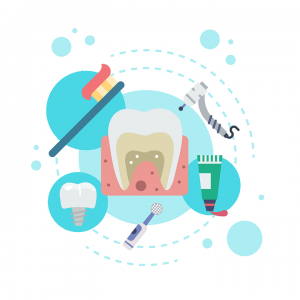
Getting teeth removed is a common dental procedure that can cause dry socket
-
Ease Root Canal Pain
Root canal treatment can leave you feeling sore, though this should ease in just a few days. If you do start to feel pain though it could be an early sign of infection. Thanks to its antibacterial properties, tea tree oil could mean you don’t have to race straight back to the dentist. Use the same swabbing technique as we described for the treatment of dry socket pain and you should see an improvement. If after a few days you don’t see any positive change, arrange to see your dentist again.
-
Heal Foot Blisters
Making a mixture that’s one part tea tree oil and three parts vegetable oil is a great way to heal foot blisters. Apply the mixture to your blister using a cotton pad and leave to soak for ten minutes. You can then gently rinse your foot with cold water. The antibacterial properties in the tea tree oil will help to speed up the healing process and prevent the blister from becoming infected. Use this method twice a day until the blister is healed.
-
Treating Ear Infections
This is another health benefit of tea tree oil that’s down to its antibacterial properties. Diluting a few drops in a quarter of a cup of olive oil and drop this into your ear using a small dropper. Make sure to keep your head tilted for a minute afterward to allow the mixture to get inside your ear and reach the point of infection.
-
Cellulitis
Research has indicated that tea tree essential oil has the ability to accelerate the healing process of cellulitis. This is most likely as a result of its antifungal, antibacterial and anti-inflammatory qualities. Moisten a cotton swab with a few drops of the tea tree oils and dab it against the infected area. Let the oil soak in over the course of a few hours before washing it off with cold water.
-
Treating Oral Thrush
Several studies have indicated the effectiveness of tea tree oil as a treatment for gingivitis and oral thrush. Gargle with a tablespoon of diluted tea tree oil around four times a day. Its antifungal qualities should help to clear up the infection. It’s always best to check with your dentist to see if they recommend a specific concentration of tea tree oil. Remember to rinse your mouth out thoroughly with water after use too!
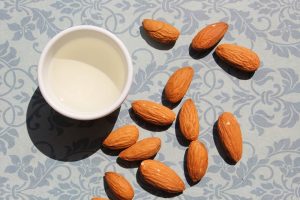
Tea tree oil can be diluted in almond oil
-
Blepharitis
Blepharitis, like a stye, is another condition that causes an inflammation of the eyelid. The anti-inflammatory qualities of tea tree oil can help reduce this swelling and treat the pain of the condition. Make sure to avoid getting any tea tree oil in your eye though as this could cause irritation or damage to the eye.
Make sure you thoroughly dilute the oil before applying it to a cotton pad and dab it very gently over a tightly closed eyelid. Don’t over soak the cotton pad in order to prevent any excess oil dripping into your eye.
-
Dark Circles Under the Eyes
By bringing down swelling around the eyes, tea tree oil can help to reduce the appearance of dark circles. Only use a small amount and be careful not to get any tea tree oil in your eye.
-
Great For Hair Growth
Tea tree essential oil isn’t just great for our preventing infections, it has other health benefits too. One of these is its ability to help your hair grow longer, thicker, and stronger. You can try massaging a few drops into your scalp or mixing it with your regular shampoo. Adding tea tree oil to your shampoo or conditioner can also help to form a protective layer over your hair, giving it more strength and boosting growth.
-
Treat Eczema
Eczema can cause dryness of the skin which can then lead to itching and the formation of painful blisters. Because tea tree oil works as an antiseptic it can soothe the skin and relieve the itching. As a result, it can also help to reduce the consequential blisters and rashes.
Mix twenty drops of the oil with a cup of coconut oil and apply the mixture to your dry skin. Adding tea tree oil to your bath water can also help if your eczema has spread to many areas of your body.
-
Removal of Skin Tags
Skin tags are small growths on the skin. They’re usually fleshy colored and are generally harmless. They can, however, be difficult to remove. Tea tree oil has been found in numerous studies to help treat skin tags thanks to its antiseptic and antibacterial qualities.
If you apply some diluted tea tree oil to your skin tag using a cotton pad and leave it to dry for a few hours. After repeating this method for a few months you should start to notice your skin tag fading.

Skin tags can also be removed by simply cutting them off with sterilized nail cutters
-
Soothe Chickenpox
Chickenpox can cause severe itchiness, which can make it high irritating an uncomfortable, especially for young children. Tea tree oil’s antiseptic nature can help relieve this itchiness and soothes the skin. Adding a little tea tree oil to your bath water is a great way to soothe your chickenpox. Run a warm bath, add in some oil and soak for half an hour.
-
Reduce the Appearance of Scars
Tea tree oil can also help tackle scars by helping them to heal and lighten. You can add a drop of tea tree oil to one and a half teaspoons of honey. You can then massage this mixture into the scarred skin and let it rest for fifteen to twenty minutes. After that, you can rinse the mixture off with cool water and repeat daily. Over time, you should notice the scars lighten.
-
Reduce Itching from Bug Bites
Tea tree oil is well known for its soothing qualities. This makes it great for soothing the itching and swelling that can be caused by an insect bite. Many bug bite remedies contain extracts of tea tree oil but you can also make your own by mixing a few drops of tea tree oil with an equal amount of coconut oil and apply it to the bite. The swelling will go down and the itchiness should subside.
-
Treating Ringworm
Ringworm is a highly contagious fungus which can spread easily through contact. Thankfully ringworm can be treated with tea tree oil. This is largely down to its antifungal properties which make it a great alternative to some other chemical-based treatments. You can apply diluted oil (diluted with a few drops of almond oil) directly to the affected area two to three times a day. This will help to clear up the infection and prevent it from spreading. Make sure you wash your hand thoroughly after coming into contact with the fungus.
-
Treating Cold Sores
Cold sores are small blisters that generally form around the mouth area. They’re caused by the herpes simplex virus (HSV) and while the virus cannot be cured, there are things you can do to prevent further outbreaks of cold sores. Using tea tree oil is one of those things!
When you feel a cold sore forming (this will usually be signaled by a tingling in the lip) apply a tea tree oil mix to the area. Mix two or three drops of tea tree oil with some coconut or jojoba oil and apply using a cotton swab. Repeat this three times a day. If the blister has started to crust over, try to remove some of this crusting with a swab first. This will allow more of the oil to soak in.
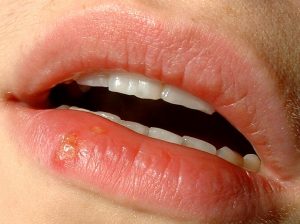
It is best to avoid kissing when you have a cold sore to avoid spreading it
-
Reduce Warts
Like cold sores, warts are caused by a virus, and like cold sores, they benefit from tea tree oil’s antiviral and antiseptic qualities. To use tea tree oil as a treatment for warts, clean the area first and pat it dry gently. You can then place a drop of tea tree oil directly onto the wart and cover with a bandage overnight. In the morning, remove the bandage and make sure you clean the area thoroughly. Continue with this process for up to four weeks or until the wart fades/falls off.
-
Treat Navel Infections
Because of its antifungal and antibacterial qualities, it’s hardly surprising that tea tree oil is so good at fighting infections. Navel infections are just another to add to the list. If you do get a navel infection you can mix some tea tree oil with some coconut oil and apply it to your belly button using a cotton pad. Leave the mixture on for around ten minutes before gently wiping it away with a clean tissue. Repeating this two or three times a day should bring a positive result.
-
Combat Pneumonia
Inhaling tea tree oil has been shown in studies to ease the symptoms of pneumonia in medical situations. However, there isn’t yet any evidence that suggests it can be used in home remedies, but it might be something to ask your doctor about.
-
Treats Swollen Lymph Nodes
Swollen lymph nodes are usually a sign of viral infection and as we know, tea tree oil is great at fighting viruses. Applying a little tea tree oil to the swollen gland can help to relieve this swelling for up to 24 hours. You can also inhale the oil’s scent to help reduce internal swelling. remember, tea tree oil should not be ingested and you should dilute it with coconut oil before applying it to your skin and only use a few drops at a time.
-
Gives Relief from Razor Burns
Razor burns can be incredibly uncomfortable and they can also look a sore and angry. Whilst there are treatments that can help, the wrong treatment could irritate them further and make them worse. particularly uncomfortable and unsightly. Apply a few drops of tea tree oil to a cotton pad and gently dap the affected areas immediately after shaving. This will help to soothe your skin so that the burns are able to heal.

Shaving slowly and carefully will lower the chance you will get razor burn
-
Soothes Boils
Boils are usually the result of an infection of the hair follicles on the surface of your skin. As your blood cells rush to the infected area to heal it, they can make the boil more inflamed and tender. Whilst you should have your boils treated by a doctor, tea tree oil can help in the meantime. Dab on a few drops of tea tree oil using a cotton pad. Be very gentle so as not to cause any extra pain and discomfort. Done properly, this can really help to soothe your boils.
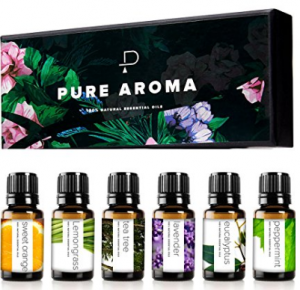
100% PURE AROMA Essential oils 6-pack (Eucalyptus, lavender, lemon grass, orange, peppermint, and tea tree). ($6.95)
What will you use tea tree oil for next? Comment below!
References
https://www.webmd.com/vitamins/ai/ingredientmono-113/tea-tree-oil
https://www.healthline.com/nutrition/tea-tree-oil#section16
https://australian-bodycare.com/uk/tea-tree-oil-good-skin/
https://www.up-nature.com/blogs/news/amazing-tea-tree-oil-uses-and-benefits
https://www.stylecraze.com/articles/amazing-benefits-of-tea-tree-oil-for-skin-hair-and-health/#gref


